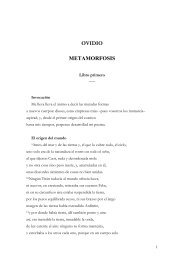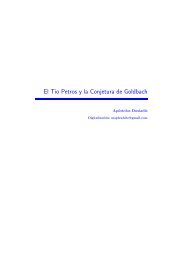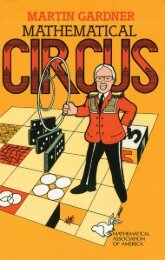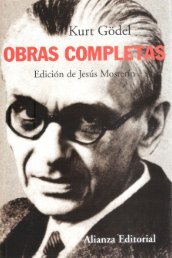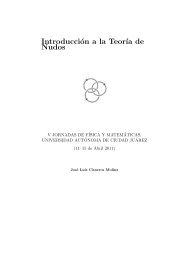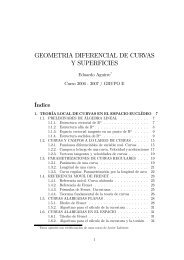Tao_T.-Analysis_I_(Volume_1)__-Hindustan_Book_Agency(2006)
Tao_T.-Analysis_I_(Volume_1)__-Hindustan_Book_Agency(2006)
Tao_T.-Analysis_I_(Volume_1)__-Hindustan_Book_Agency(2006)
Create successful ePaper yourself
Turn your PDF publications into a flip-book with our unique Google optimized e-Paper software.
2.1. The Pean? axioms<br />
However, we shall stick with the Peano axiomatic approach for<br />
now.<br />
How are we to define what the natural numbers are? Informally,<br />
we could say<br />
Definition 2.1.1. (Informal) A natural number is any element of<br />
the set<br />
N := {0,1,2,3,4, ... },<br />
which is the set of all the numbers created by starting with 0 and<br />
then counting forward indefinitely. We call N the set of natural<br />
numbers.<br />
Remark 2.1.2. In some texts the natural numbers start at 1 instead<br />
of 0,. but this is a matter of notational convention more than<br />
anything else. In this text we shall refer to the set {1, 2, 3, ... } as<br />
the positive integers z+ rather than the natural numbers. Natural<br />
numbers are sometimes also known as whole numbers.<br />
In a sense, this definition solves the problem of what the natural<br />
numbers are: a natural number is any element of the set 1<br />
N. However, it is not really that satisfactory, because it begs the<br />
question of what N is. This definition of "start at 0 and count<br />
indefinitely" seems like an intuitive enough definition of N, but it<br />
is not entirely acceptable, because it leaves many questions unanswered.<br />
For instance: how do we know we can keep counting<br />
indefinitely, without cycling back to 0? Also, how do you perform<br />
operations such as addition, multiplication, or exponentiation?<br />
We can answer the latter question first: we can define complicated<br />
operations in terms of simpler operations. Exponentiation<br />
is nothing more than repeated multiplication: 53 is nothing more<br />
than three fives multiplied together. Multiplication is nothing<br />
more than repeated addition; 5 x 3 is nothing more than three<br />
fives added together. (Subtraction and division will not be covered<br />
here, because they are not operations which are well-suited<br />
1Strictly speaking, there is another problem with this informal definition:<br />
we have not yet defined what a "set" is, or what "element of" is. Thus for the<br />
rest of this chapter we shall avoid mention of sets and their elements as much<br />
as possible, except in informal discussion.<br />
17



